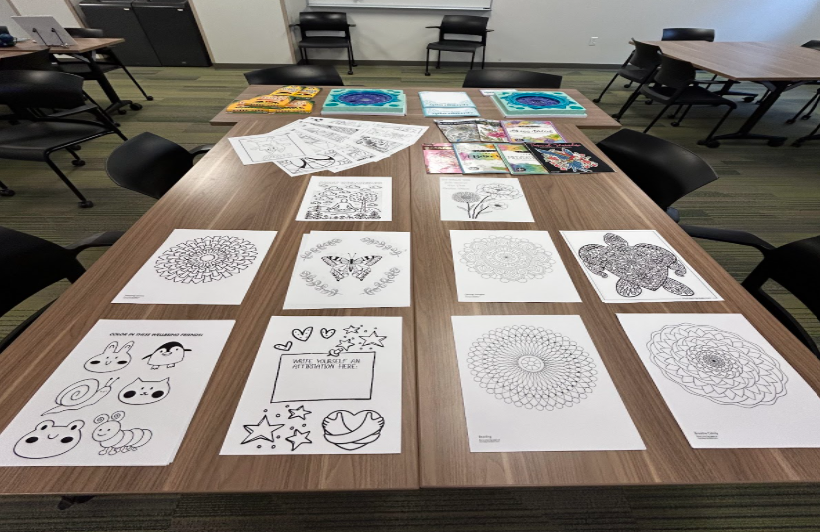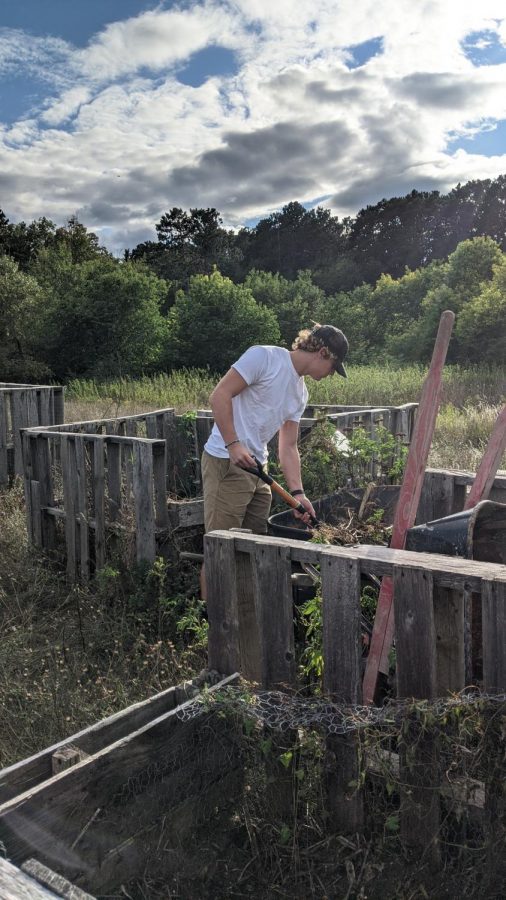Initiative aims to make industrial composting more accessible
Reid Kenyon volunteers at the hoop house and helps turn compost. Anyone is able to donate their food scraps to the compost bins at the hoop house to help create rich soil for growing plants.
September 21, 2021
An industrial composting project is currently underway to come to all NMU Dining services.
Zoe Tardy, senior environmental science and natural resource management major, submitted a model for an on-campus composting program to the Sustainability Advisory Council.
“They took my idea and made it way bigger than anybody had expected,” Tardy said. “It started off as a program that I was just going to run myself that involved five gallon buckets with twist on gamma seal lids being placed across campus, and once a week I would collect those buckets and bring them to the Jacobetti Center.”
Tardy expected to construct a bigger composting system at the NMU Hoop House — a student-run community garden located next to the Jacobetti Center.
The Sustainability Advisory Council scaled that project up into having a designated organic matter waste bin outside of every dining area on campus.
Jes Thompson, professor in the college of business, member of the Sustainability Advisory Council and faculty advisor for EcoReps, played a key role in encouraging Tardy’s model.
“In NMU’s Dining services they are moving to all compostable packaging, so then we have plastic-free, or what they call petroleum-free packaging,” Thompson said. “That gets us off the fossil fuel path, and gets us into other … regenerative things that can be composted from an orange peel and apple core, but also to notebooks and pieces of paper and paper towels.”
All of the packaging and food scraps from NMU Dining are post-consumer organic matter that can be placed in the compost bins outside of each eatery.
“The bins will have compostable liner bags, and then once or twice a day dining services employees are going to go around campus and collect all those bags and bring them to a large compost dumpster,” Tardy said.
Once a week Recycle 906 will pick up the compost dumpster and bring it to their facility to be industrially composted.
NMU dining services currently compost all pre-consumer waste.
Executive chef of NMU dining Alden Griffus said, “we in dining already work with Partridge Creek Farm collecting pre-consumer compostable materials (vegetable trimmings, eggshells, coffee grounds, etc).”
Additionally, NMU dining kitchens redistribute leftover food that was not served to students.
“Our leftover food goes to one of three places. First, we use the food at another time within the operation, as long as the quality is not diminished. Second, if there isn’t enough left over to reuse in the operation, we donate it to a local organization. Third, some of the food does end up in the trash, if the quality is diminished and we cannot serve it again elsewhere,” Griffus said.
Dining services hopes to add the unusable leftover scraps to the post-consumer composting collection that is being implemented.
The NMU Hoop House currently offers a small-scale composting program. Students and members of the community can donate their collected food scraps to the on-site compost bins constructed from pallets.
Lovisa Kunkle, senior ecology major and co-leader of the Hoop House said, “basically what composting is is taking food scraps and food waste and turning them into soil that you can then use again for gardening.”
There are signs posted near the pallets with information on the accepted materials that can be collected.
Accepted food scraps include eggshells, vegetable and fruit scraps, tea leaves and coffee grounds. Meat and dairy products can not be composted.
“It just can’t have meat or like chicken bones, no dairy. Mostly because it starts to smell and the way it decomposes is pretty slimy and gross,” Kunkle said. “Refrain from tossing pits, just because they basically never decompose, no avocado pits or peach pits, things like that.”
The process of creating compost consists of mixing the food scraps with brown material, such as cardboard and weeds, which are broken down to create nutrient-rich dirt.
Composting at the NMU Hoops House is small-scale, limited, and is not entirely accessible to all students, so the new composting model coming to campus will make it easier for students to decrease their carbon footprint.
“If you ever eat a banana and throw it away it will break down, but it’s going to be doing so in a way that produces methane as a byproduct which, as science tells us, is a more impactful greenhouse gas than carbon dioxide,” Tardy said.
According to Tardy, her model will reduce the amount of methane produced on campus and diverge student waste from landfills.
The on-campus composting system is scheduled to be implemented by the start of the upcoming winter semester, given all of the funding and logistical details are figured out.





























